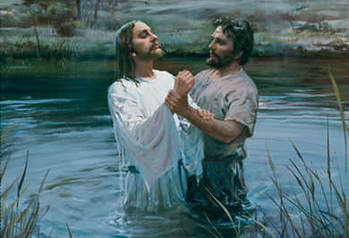 John the Baptist baptizes Jesus Christ in the River Jordan. (Matthew 3:13-17) In the waters of baptism, we make sacred covenants with the Lord. We promise to be His disciples, and to take upon us the name of Christ. In many Christian religions, baptism is essential to salvation. In Mormonism this is true as well. The Church of Jesus Christ of Latter-day Saints has a great doctrine and understanding of the principle. Jesus Christ, the one who was perfect, without sin, needed baptism for His own salvation. Many like to focus on the aspect of baptism where it washes away our sins, making us clean. Why would the sinless Christ have need of such a thing? But it does more than just cleanse sins. Baptism is the first step in a series of covenants that we must make in order to live with God once more. It numbers us with those on the Lord's side, and our willingness to do so allows us to show the Father we are humble enough to submit to His will. This is why even Jesus had need to be baptized. He did so to submit to the will of the Father, and to lead us by example in the direction we must go. If even the perfect Jesus Christ has need to be baptized by water, how much greater need do we have to do the same? Some Christian denominations, Mormonism among them, stress the importance of baptism by immersion, meaning that the individual being baptized must go all the way under the water. Some may wonder why this aspect of baptism is so important. The reason a person must be immersed is that, at its core, baptism symbolizes quite plainly the death, burial and resurrection of Christ. The baptizee "dies" and is "buried" in the water. They are then "resurrected", being pulled back out of the water a new person. It signifies the end of a life of sinning, and rebirth as a disciple of Christ. In the LDS Church, no other way is sufficient. All those wanting to live with their Heavenly Father once more must partake in baptism by the proper authority. Being mortal, we are weak. We have temptations and opportunity for sin all around us. It is inevitable that each of us will slip from time to time, and many of these slip-ups take place after baptism. After we have been completely cleaned, we become dirty once more, and no unclean thing can dwell with God. For this, our Father in Heaven has provided us with a wonderful gift: the Sacrament. In Mormonism, Church meetings take place every Sunday. In one of these meetings, those practicing repentance can renew their baptismal covenants by taking the sacrament: broken bread and water which has been blessed by the proper priesthood authority. This special meeting imitates Jesus Christ's " Last Supper", in which he blessed bread and wine and gave of it to His disciples, asking them to partake in remembrance of Him. The wonderful gift of the Sacrament allows us to re-cleanse ourselves, becoming just as clean as we were at baptism. Do little children need baptism? No. Jesus has proclaimed that little children are alive in Christ. They are completely perfect and incapable of sin, because they don't know any better. Little children who die are not accountable and so are guaranteed salvation. The LDS Church therefore, only baptizes those who are over the age of eight. But what about those who die without baptism, who would have accepted the Gospel of Jesus Christ if only given the chance? They are not out of luck. This is one purpose of Mormon Temples; the redemption of the dead. Faithful Latter-day Saints may be baptized in place of their ancestors, allowing the deceased to choose if they accept this ordinance on their behalf. Thus, all who have sufficient faith may partake in baptism. What a wonderful feeling it is to enter the waters of baptism and to become purified in Christ. For more info on the Sacrament, click here.
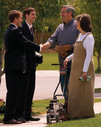 As a missionary myself, I have on several occasions pondered about the great men and women who came before me, who for a season gave their lives to the Lord to bring about His great work. Indeed, throughout the history of Mormonism, there have been over a million brave souls who have sacrificed their time and efforts in some capacity on the Lord's errand. Though the message has stayed the same, since the beginning of LDS missionary efforts, there have been many changes and developments in the way missions are conducted, who is called to serve, and how the message of the gospel is shared.
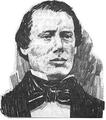 Samuel H. Smith (right), the younger brother of LDS Church founder and Prophet Joseph Smith, is regarded by many as the first full-time missionary of the Church. He served many missions for the Church throughout his lifetime, but in his first one to Mendon, New York, he encountered one John P. Greene, giving him a copy of the Book of Mormon. Greene would eventually be baptized into the LDS Church, and so would his brother-in-law, Brigham Young, who would go on to become the second Prophet of the Church.
From Mormonism's inception in 1830, many missionaries were called to preach throughout the eastern U.S., but the official structure and organization of the missionaries took hold in 1839, when the New York City Mission was officially organized, John P Greene being called to preside over it. Greene would be in charge of all the missionaries in that area, delegating necessary duties, and acting as a liaison between the missionaries and the Church leaders. A similar structure still exists in modern missions though each area has its own specific needs and challenges, necessitating some minor variances.
The early history of Mormonism (much of the nineteenth century) saw an increase of missions throughout what is now the United States. Missions sprung up from coast to coast, with missionaries serving in the eastern states, preaching to the Cherokees of Oklahoma, all the way to California. There were even some elders sent to the Hawaiian Islands.
The work exploded in the mid to late 1800's and even more so at the turn of the twentieth century. Early on, the Church established the British mission, but didn't expand across Europe until after the Saints had arrived in Utah in 1847. Gradually the Church's mission force would obtain the reach it has today, with missionaries in most of the countries of the world, only blocked from those nations which outlaw either religion and/or proselytism. They continue this day to bring the fullness of the Gospel of Jesus Christ to God's sons and daughters all over the world. It is indeed a thrilling privilege to take part in such a legacy.
 Since I was but a wee lad, I've always loved, loved, LOVED Christmas. Though perhaps my reasons for this love have evolved over the years, the season just fills me with an almost childlike giddiness. Much of Christiandom yearly celebrates this veneration of Christ, and my faith ( Mormonism) is no exception. Though Mormons don't really do anything vastly different than other Christmas celebrators, it's hard not to bring up the development of my own personal fledgling faith in connection to the Christmas spirit. Like most American children, I was taught of the mystical Santa Claus, who lived at the north pole, was morbidly obese, and brought presents to all the good children of the world. It was a whimsical, if silly, legend that was lots of fun to take part in each year. But I'm forever grateful that my parents, while happy to entertain our young minds with Santa, always drove home the real reason we were giving gifts to one another . Every Christmas morning, before rushing downstairs for the merriment, my mom and dad would always gather the family into one room, and we'd kneel on the floor and say a prayer to God, thanking Him for this joyous holiday which allowed us to commemorate the birth of our Savior Jesus Christ. The non-Santa aspects of Christmas have always carried with them a weight of reverence, and they have inspired my faith from the very beginning. I have nothing against those who do not celebrate Christmas. But it always bothers me a bit when otherwise deeply Christian people seem so jaded with the whole experience. It's gotten to the point of cliche for people to declare their hate for the holiday. Perhaps those people have legitimate reasons for their distaste for the season, but I wonder if their aversion would be better directed at particular aspects and traditions of Christmas, rather than discounting it altogether. So companies are exploiting Christmas for commercial reasons? You don't have to. So you have to spend it with an annoying distant relative? Buck up, and remember that experiences can only be positive when you bring the right frame of mind. Not to point to myself as a wonderful example, but if ever I feel myself displeased with some hassle of the season, or disappointed with some yuletide experience, I quickly remind myself of the Babe in Bethlehem, my Lord Jesus Christ. I try to emulate his example of giving, love, and gratitude. Surrounding myself with whatever family and friends that are available, I joy in the high spirits and laughter that Christmas can bring, if only we let it.
 There's a concept in Mormonism that deserves to be expounded on, as it is essential to the salvation of every person. It is a gift that each person who has ever existed has been endowed with at birth. Given to us by God, it is our's to keep, and we decide how we'll use it. It's called "agency". Agency is a similar concept to "free will", but with a subtle difference. Free will denotes the fact that we as people have the right to do whatever we choose. Agency on the other hand, refers to our very ability to choose. We practice agency in every choice that we make. Not every choice is a big one, but we have the ability to choose, resist, embrace, or act upon any external influence, and that in itself is amazing. It doesn't just apply to Mormonism; its an all-encompassing principle that touches everyone. In the tests and trials of life, agency is the most valuable measuring stick with which we can be judged. If you think about it, without the ability to choose for oneself, a test would be meaningless. We would would all pass with flying colors, but none of us would grow. We would remain stagnant beings, choosing right because that is what we were forced to do, not because we actually were righteous. It would be like taking a child through school and giving them all the answers along the way, all the way through med-school and then asking them to perform brain surgery. What was the point in testing if you knew the outcome? It is therefore of the utmost importance that we are able to choose for ourselves how we will act. An important thing to remember is that, although we are free to choose our actions, we are not free to choose the consequences. It is within our capability to choose evil, but we do not get to choose what happens to us because of that evil. Others can use their agency, and their choices more often than not, effect us, and our's them. Such is the way of this test we call life. Even if some outside force, be it the choice of another, or pure chance, effects us for the worse, we still have the choice of how we will move forward. We can react, build, adapt, create, improve, and much more. It ultimately boils down to choice between two masters and two paths; God, Jesus Christ, and all that is good, or Satan and all that is evil. This is our choice, this is everyone's choice. And I feel privileged to be able to make it. For a similar article on agency, read this post.
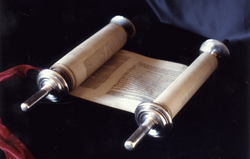 The Church of Jesus Christ of Latter-day Saints has an "open canon" of scripture. This means that the LDS Church teaches that God's revelation of divine principles to mankind did not end with the conclusion of the Holy Bible. It is a fundamental belief in Mormonism that God has not shut the door on mankind, that the fullness of the Gospel of Jesus Christ has been restored to the earth, and that God speaks to us today through the mouths of His prophets and through personal revelation in answer to prayer. Officially, there are four books which the LDS Church has declared "canon". Together, these books of scripture constitute the "Standard Works". Here they are in no particular order.
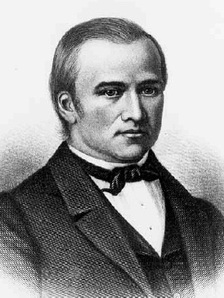 Newel K. Whitney (left) is an extremely important figure in the history of Mormonism. While somewhat obscure, many members of the Church of Jesus Christ of Latter-day Saints are familiar with story of his first encounter with Joseph Smith, in which the Prophet famously said, "Newel K. Whitney, thou art the man." But a story like this one needs a little background. Born in 1795, a full ten years before Joseph Smith Jr., the first Prophet of the Church, Newel Whitney grew up in Vermont, but as an adult would move to Kirtland, Ohio and open a general store having some success in business. In the late 1820's, Newel and his wife, Elizabeth Ann Whitney were on a spiritual journey of sorts. They were looking for a church to join, and for a while were active in the Campbellite movement, though eventually returned to their search. In late 1830, just months after the Church of Jesus Christ of Latter-day Saints had officially been founded, the Whitneys were visited by the missionaries, who brought with them a copy of the Book of Mormon. Elizabeth Whitney heard the missionaries' message first, and was deeply moved, getting baptized into the Church November of that year. Newel still wasn't convinced though, and continued to pray for an answer. In February of 1831, Joseph Smith himself journeyed to Kirtland, Ohio and showed up unannounced to Newel K. Whitney's store. Joseph marched right up to Newel and proclaimed, "Newel K. Whitney, thou art the man!" Whitney had never seen Smith in his life, and didn't know what the Prophet was talking about, or how he knew his name. Smith explained, "I am Joseph the Prophet. You prayed me here; now what do you want of me?" This was exactly the witness that Whitney needed. Soon Newel K. Whitney would join the Church, and in time became one of the greatest leaders in the history of Mormonism. When he died in 1850, he was the Presiding Bishop of the Church. He left a great legacy, and one that continues to today. His family and descendants shared his trait of hard work and faith, and continue to bless the world through their service.
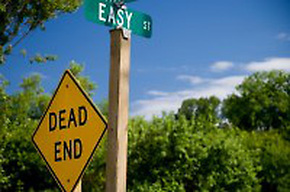 Technically, the Church of Jesus Christ of Latter-day Saints ( Mormonism) has been in my family for several generations. I grew up in a family of people who grew up in the Church. It has always been in my life. I imagine this is true of many different people in many different religions; Their faith is in their blood, a hereditary trait almost. While the above scenario describes myself and many others, it is not true of everyone in my religion. Many among our number were born into other churches or belief-systems, worshiping in other ways, and following different rules. For a myriad of reasons, these people took their own spiritual journeys, and found for themselves something the rest of us grew up with. While I am ever grateful for my upbringing in the beautiful Gospel of Jesus Christ, I have always had a certain respect for converts, those who sought for the truth, and found something wonderful that I was practically handed. They had to work for it, and they might have had to overcome obstacles and baggage along the way that I was never burdened with. I always joy in hearing their stories, who they used be, or what they had to face on the road to Christ. I look up to these people for their hard work, and their faith. It got me thinking about my own story. Though I was very thankful for the generous blessings that have been bestowed on me, I couldn't help but feel a little bit jealous of converts. These are men and women who worked for something I sometimes take for granted. The Gospel of Christ really means something to them, because they know what it's like without it. When I think about it, my logic is all backward. It's like a man who's inherited great riches that envies a once-poor man who worked hard and became rich by the sweat of his own brow. I had it all wrong though. I am still on a road to Christ, and so are those people I envied. I was mistakenly viewing conversion as a destination, a one-time event. I have come to realize, however, that conversion is not a stop along the road, but the road itself. I had thought of myself as a man who was born at the destination. I liked where I was, but felt a little robbed of the journey that others got to take. But that was not the case at all. It was more like I had been born at the trailhead, in the company of men and women who know the the road, and can give me directions when I need them. I have companions to share the adventure with, and protectors to keep me safe from the perils of the journey. Others may have had to search for the path, and as I've met them on the road, I've welcomed them into my convoy excited to learn about my new fellow traveler. We are all travelers on the road of conversion. This road leads to Jesus Christ. It is a bumpy road, and not always the easiest road, and we might occasionally try alternate routes. But this long, bumpy road is the only one that leads to true happiness. Other roads may offer a more comfortable journey in the short-term, but they lead nowhere. Why sell an eternity at a wonderful destination at the end of a winding mountain road for a fleeting detour down Easy Street, a wide, smooth freeway that offers nothing but a dead-end in a bad neighborhood? In this sense, I am a convert to Mormonism, a convert to the gospel of Jesus Christ and His teachings. I may have had certain advantages on my journey, but I, along with everyone else, must take the journey all the same. I look forward to seeing you on the road.
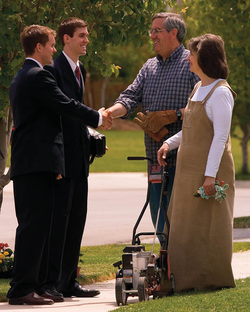 Unless you live in a nation that outlaws proselytism, you probably have at one point in your life, had some sort of contact with one of the Mormon missionaries. Maybe you've seen them handing out copies of the Book of Mormon on the street. Perhaps you've seen them on their bikes, on the way to some appointment. Maybe they've even knocked on your door. Though they may know of them, people might not always know a whole lot about these these missionaries who spread Mormonism throughout the world.
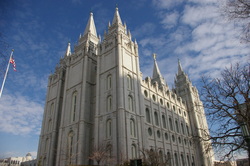 To those unacquainted with Mormonism, (the slang term for the Church of Jesus Christ of Latter-day Saints) it can be tricky to tell the difference between the actual Church and its several "branch-off" groups. It's an unfortunate but all-too-common situation that the unfamiliarity with the Church's history causes some to lump the LDS Church together with these other sects, leading to great confusion over who's who, and who believes what. Historically, there have been a handful of offshoots from the Mormon faith. Here's a few examples, and their distinctive characteristics.
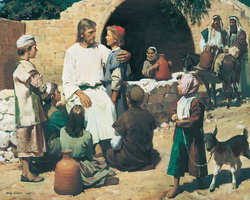 Jesus Christ takes on many roles. He is our teacher, our master, our elder brother, and our redeemer, just to name a few. One exceptionally large role he fills is as the Son of God. But what does it mean to be the Son of God? Aren't we all God's children?
|











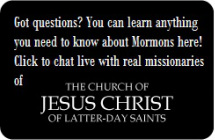
 RSS Feed
RSS Feed